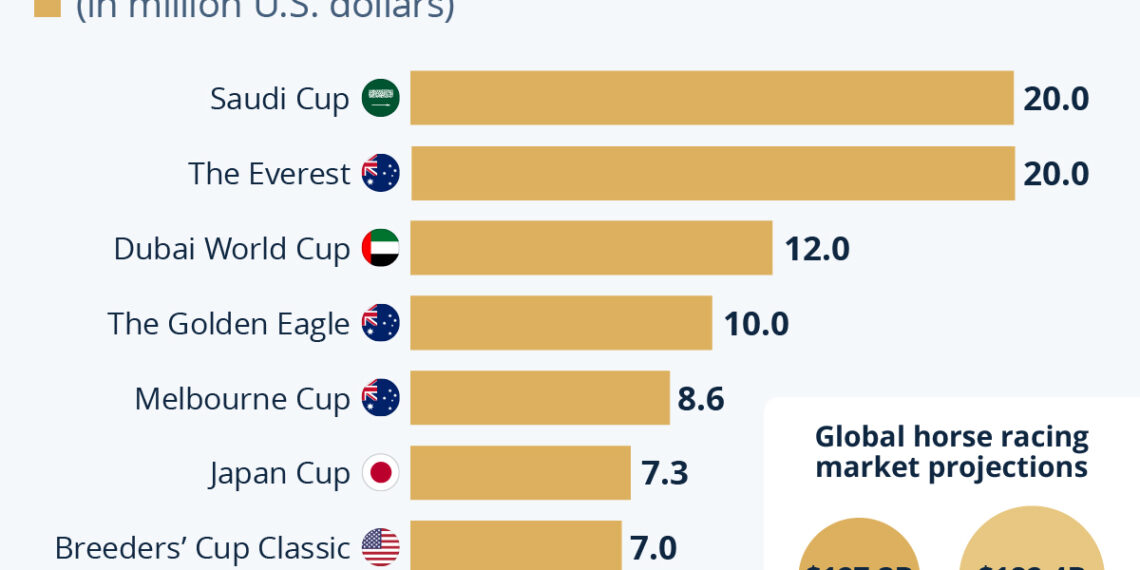Select Language:
The Lucrative World of Horse Racing
Horse racing has long captured the hearts of millions, and it is not just the thrill of the race that draws enthusiasts; it is also the significant financial stakes involved. In recent years, the industry has seen remarkable growth, becoming a multi-billion-dollar global enterprise. Let’s dive deeper into this world and explore its most prestigious events, financial implications, and future potential.
The Global Reach of Horse Racing
Horse racing is not confined to one region; it enjoys immense popularity across the globe. Major racing events are held in various countries, making it a truly international sport. From the Derby in the UK to the Kentucky Derby in the US, these events attract not only horse lovers but also investors and betting enthusiasts.
Major Players in the Horse Racing Market
The Dubai World Cup
The Dubai World Cup, scheduled for April 5, stands as one of the crown jewels in the realm of horse racing. With a staggering prize fund of $12 million, it ranks among the most lucrative races globally. Broadcast in 170 countries, the event showcases the finest horses, riders, and stables, drawing substantial viewership and attention.
The Saudi Cup and The Everest
Despite the impressive prize of the Dubai World Cup, two races eclipse it in terms of financial payouts: The Saudi Cup and The Everest. Both events offer a breathtaking $20 million prize purse, solidifying their status as the richest races in the world. The Saudi Cup takes place in Saudi Arabia, while The Everest is known for its extravagance and takes place in Australia, demonstrating the global appetite for high-stakes horse racing.
Regional Insights on Top-Ranked Horse Racing Events
Arabian Peninsula and Australia
The Arabian Peninsula and Australia are not the only hotbeds for high-stakes races. These regions are renowned for their extravagant horse racing events, drawing participants and spectators from around the world. The Arabian horse’s historical significance, combined with luxurious race settings, makes events like the Dubai World Cup a must-watch.
United States and Japan
The United States and Japan are also significant players in the lucrative horse racing market, each hosting numerous high-profile events with substantial prize purses. States such as Kentucky are synonymous with horse racing, and events like the Belmont Stakes and the Preakness Stakes continue to contribute to the culture and economy of their regions. Concurrently, Japan has gained recognition for its impressive races and high-quality horses, bolstering its reputation on the global stage.
The Financial Impact of the Horse Racing Industry
The profitability of horse racing extends beyond just prize purses. It encompasses various financial aspects, including betting revenues, sponsorship deals, and tourism. A recent forecast by Research and Markets projects that the global horse racing market may reach a staggering market size of approximately $127 billion by 2025. This growth reflects not only the popularity of the sport but also the potential for investment and development within the industry.
Betting Revenues
Betting is a significant contributor to the financial success of horse racing. It is estimated that millions are wagered on races worldwide, ranging from local tracks to major international events. As the digital landscape grows, the accessibility of online betting platforms is also increasing, further boosting revenues and expanding the audience.
Sponsorship and Partnerships
Corporate sponsorships play a crucial role in the profitability of horse racing events. Companies recognize the marketing potential within this vibrant community and often partner with racing events to promote their brands. These partnerships provide financial support and enhance the overall spectacle of the races, adding to the glitz and glamour associated with them.
The Future of Horse Racing
As the horse racing industry continues to evolve, it is likely to undergo significant transformations. Technological advancements, changes in consumer preferences, and shifting demographics all suggest a promising future for horse racing. The ongoing popularity and visibility of major races ensure that interest remains high, attracting not only seasoned fans but also newcomers to the sport.
With a robust global market, high-stake races, and a growing investment landscape, the world of horse racing stands poised for an exciting journey ahead. The intersection of tradition and modernity will continue to reshape this age-old sport, keeping it relevant to future generations.







